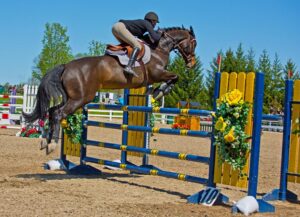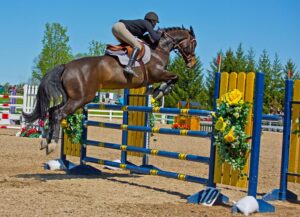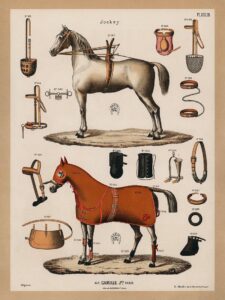Horses have long been revered for their beauty, strength, and grace. But behind every well-trained equine athlete is a skilled trainer who has dedicated countless hours to perfecting their craft. In the world of horse training, there is always room for growth and refinement. Whether you are a seasoned professional or a novice enthusiast, advancing your skills and knowledge in the realm of horse training is essential to unleashing the full potential of these majestic creatures. In this article, we will explore a variety of advanced horse training techniques that will help you take your skills to the next level. So saddle up and get ready to embark on an exciting journey of discovery and growth in the art of horse training.
– Developing Connection through Groundwork Exercises
When it comes to advanced horse training techniques, developing a strong connection with your horse is key. Groundwork exercises are a fantastic way to build trust and communication between you and your equine partner. By refining your skills in groundwork, you can improve your overall training experience and create a deeper bond with your horse.
One advanced technique you can try is the use of liberty work. Liberty work involves working with your horse without any physical restraints, allowing them more freedom and autonomy. This technique can help improve your horse’s responsiveness and willingness to work with you. By practicing liberty work during your groundwork exercises, you can take your training to the next level and strengthen your connection with your horse.
Another advanced groundwork exercise to consider is long-lining. Long-lining involves using long reins to guide your horse through various movements and exercises. This technique can help improve your horse’s balance, flexibility, and responsiveness to your aids. By incorporating long-lining into your training routine, you can refine your communication skills and deepen the connection you have with your horse.
– Fine-Tuning Your Communication with Advanced Riding Techniques
When it comes to refining your communication with your horse, advanced riding techniques can make all the difference. By mastering these techniques, you can take your riding to the next level and create a deeper connection with your equine partner.
One advanced technique to fine-tune your communication is collection. Collection involves asking your horse to round their back, engage their hindquarters, and lighten their forehand. This not only improves your horse’s balance and agility but also allows for more precise movements and transitions. To practice collection, focus on half-halts, transitions within and between gaits, and lateral movements such as shoulder-in and haunches-in.
Another key technique is riding with soft hands and a following seat. Soft hands allow for clear communication through the reins without putting unnecessary pressure on your horse’s mouth, while a following seat allows you to move with your horse’s motion rather than against it. Together, these skills create a harmonious partnership based on trust and understanding.
- Enhancing Performance through Specialized Training Equipment
Horse training is an art that requires skill, patience, and the right tools. Specialized training equipment can make all the difference in enhancing the performance of your horse. By implementing advanced techniques and utilizing specialized gear, you can refine your skills as a trainer and help your horse reach its full potential.
One key piece of specialized training equipment is the lunging system, which allows you to work your horse in a controlled environment without the need for a rider. This tool can help improve your horse’s balance, flexibility, and obedience. Additionally, using a variety of training aids such as lunge reins, side reins, and surcingles can further enhance your horse’s performance by targeting specific areas of need.
Another important aspect of advanced horse training techniques is the use of obstacle courses and ground poles. These tools not only help improve your horse’s physical conditioning and coordination but also test their obedience and focus. By incorporating these elements into your training routine, you can challenge your horse and keep them engaged in their work, leading to better overall performance.
– Mastering Advanced Maneuvers: Tips from Expert Trainers
When it comes to advancing your horse training skills, learning from expert trainers is essential. These professionals have spent years honing their craft and have valuable insights to share. One key tip from expert trainers is to focus on building a strong bond with your horse. By developing trust and communication, you can achieve greater success in advanced maneuvers.
Another important aspect of mastering advanced maneuvers is understanding the importance of consistency in your training routine. Consistency helps your horse learn and retain new skills more effectively. Expert trainers emphasize the need for regular practice and repetition to reinforce desired behaviors.
One effective technique that expert trainers use is desensitization training. This involves gradually exposing your horse to various stimuli, such as loud noises or unfamiliar objects, to help them remain calm and focused in challenging situations. By incorporating desensitization exercises into your training regimen, you can improve your horse’s confidence and performance in advanced maneuvers.
– Creating a Well-Rounded Training Program for Your Horse
When it comes to creating a well-rounded training program for your horse, it’s essential to incorporate advanced techniques that will refine their skills and enhance their performance. One important technique to consider is positive reinforcement training, which involves rewarding your horse for desired behaviors. This method can help strengthen the bond between you and your horse, as well as improve their overall responsiveness and willingness to learn.
Another advanced training technique to incorporate is desensitization training, which involves exposing your horse to various stimuli in a controlled environment to help them become more comfortable and confident in different situations. This can help reduce the likelihood of spooking or fear-related behaviors and create a more well-rounded and adaptable horse.
In addition, cross-training can be a valuable component of a well-rounded training program. By incorporating activities such as trail riding, jumping, or dressage into your horse’s routine, you can help them develop different skills and muscles, prevent boredom, and keep them mentally engaged and physically fit.
Concluding Remarks
As you continue to refine your skills in advanced horse training techniques, remember to always approach each training session with patience, empathy, and respect for your equine partner. By employing these advanced techniques, you will strengthen your bond with your horse and unlock their full potential. Keep pushing boundaries, learning from each experience, and never stop seeking to become the best trainer you can be. The journey to mastery is a never-ending one, but with dedication and a commitment to excellence, you will continue to grow and evolve as a horse trainer. Keep striving for greatness, and remember to always put the well-being and happiness of your horse above all else. Good luck on your training journey!



